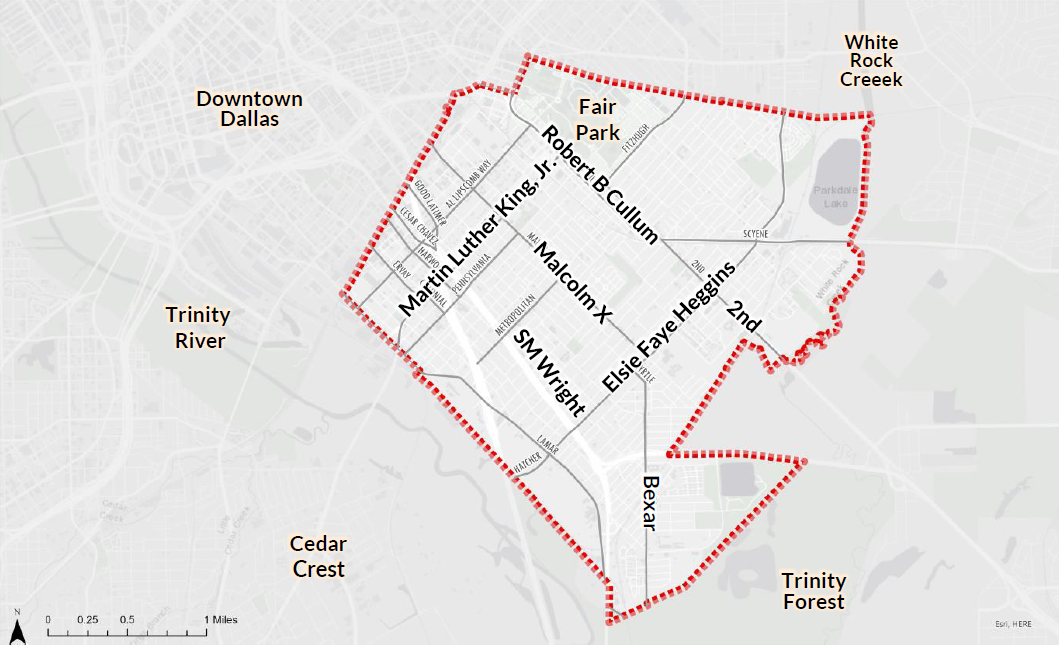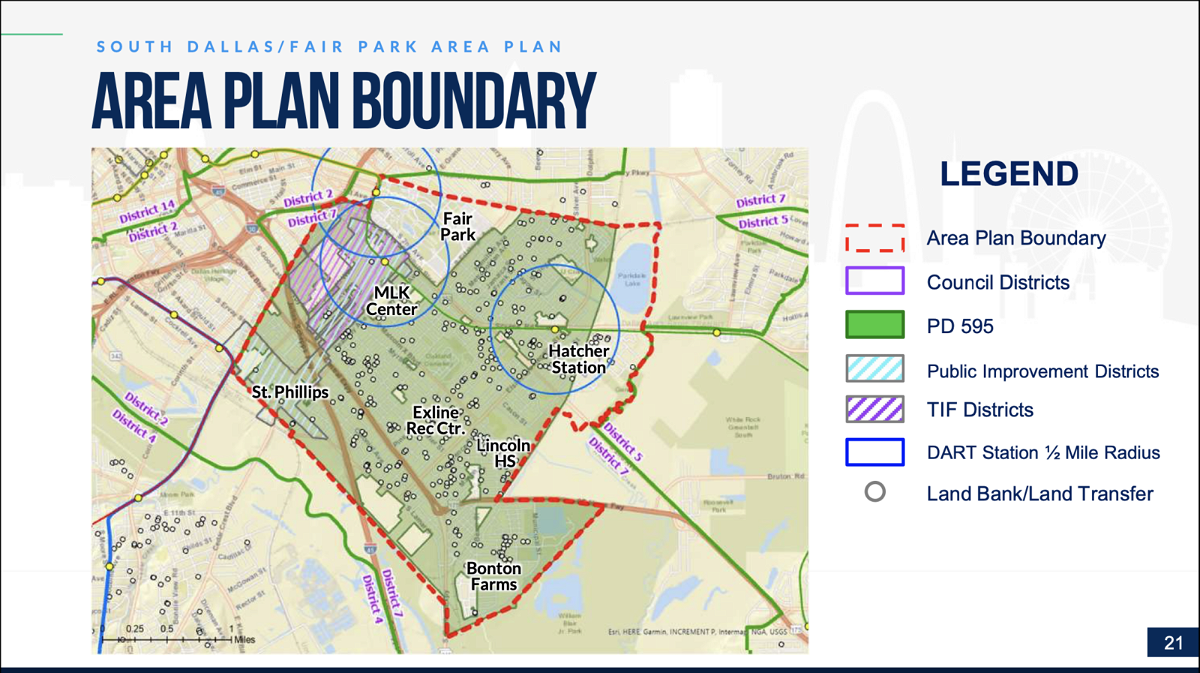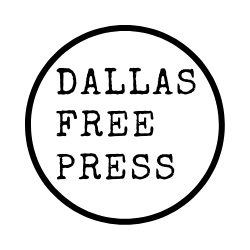
A community meeting in South Dallas this summer, which focused on land uses and zoning regulations in our neighborhood, started with a non-traditional question:
“Where do you go on Saturday morning for your goods and services?
“Oak Cliff” topped the list. Residents said they like the “nice” breakfast restaurants, bookstores and smoothie shops. Some wished the neighborhood had more family friendly places to eat that converted to adult lounges and bars in the evenings. The discussion wound its way toward improved parks, walk-up restaurants, better parking, bike lanes and sidewalks as well as mixed-use commercial housing.
“If you can identify what you leave on Saturday morning for, you can see what we need to change in our zoning,” Tabitha Wheeler-Reagan told us on a call after the community meeting. She’s the co-chair of the South Dallas/Fair Park Area Plan Task Force. Dallas City Councilmember Adam Bazaldua, who represents South Dallas, chose and assembled the group two years ago.
Most of the South Dallas/Fair Park neighborhood is overlaid by a planned development district, also called a PD or PDD, that City Council adopted more than two decades ago in 2001. Dallas has more than 1,000 PDs, which, unlike traditional zoning regulations, “allow a combination of uses such as residential, recreation, industrial, office,” according to Inclusive Community Project’s website.
“This means that to truly know what a PDD allows,” the site continues, “residents have to review its ordinance because each PDD is unique.”
PD 595 South Dallas/Fair Park Special Purpose District by Dallas Free Press on Scribd
Wheeler-Reagan says the neighborhood’s PD 595 deters new businesses from coming into South Dallas. PD 595’s initial goals were to police alcohol sales and prevent gentrification, she explains, but she and the task force believe the zoning needs to be updated — still protecting the community, but encouraging local entrepreneurs, too.
“I do not think there is so much that we want to get rid of on PD 595,” Wheeler-Reagan says. “We just want to add to, maybe take away from, and/or just do some major change-ups.”
The task force’s goal is to “look at Dallas holistically to find out what we are missing,” she says.
The way PD 595 functions is by adding more requirements to the underlying zoning that regulates how land can be used. For example, says Andrea Giles, the new assistant director of Dallas’ Planning and Urban Design department, the city’s typical zoning may require a business to have 10 parking spots, while PD 595 requires more — making it a struggle for new businesses to even “open up.”
Developers also must attain a Specific Use Permit, or SUP, for different types of business outlined in PD 595. The zoning document denotes the need for an SUP 64 times, for everything from a private club or community service center to a recycling collection center or a mini warehouse. It takes “potentially eight months to get approved and over $1,000 to do it,” Giles says of SUPs. “It can be a real barrier for a small business owner who wants entry to this market.”
“We’re SUP’ed to death over here,” Wheeler-Reagan adds.

South Dallas residents have been frustrated by repeated city promises to revitalize South Dallas, Wheeler-Reagan says. The task force reviewed recommendations from previous plans and found the same recommendations year after year, she says.
“Haven’t we done this a lot of times before?” Sandra Bowie asked rhetorically on a recent call. A service area supervisor in the City’s Planning and Urban Design department, she noted: “We have a lot of plans. So what happened to them?”
This time, the City of Dallas is going to “focus, for the first time, on a manageable action plan” for South Dallas, Bowie says.
South Dallas residents want “something that leads to implementation,” Gilles says. That’s why the task force narrowed down a “long laundry list” of needs and recommendations to focus on five specific neighborhoods.
“This is a shorter-term implementation plan,” Gilles says. “We established how this [plan] is different, as well as how we can shift into the actual teeth and connect ideas with policy.”
Gilles says members of the task force had a range of opinions, but after “a lot of back and forth,” they selected these five focus areas:
- Elise Faye Heggins/Second Avenue
- Malcolm X Corridor
- MLK Jr. DART Station
- Queen City
- Second Avenue
Other areas considered were Elsie Faye Heggins/I-175, Pennsylvania/I-175, Al Lipscomb Way/Malcolm X, Bexar Street Corridor, Botham Jean/SM Wright Freeway and MLK Jr. Boulevard/Malcolm X.
City Council is expected to vote on a new Forward Dallas plan for the entire city later this year; Dallas’ last comprehensive plan for land use was approved in 2006. The task force hopes the proposed South Dallas/Fair Park area plan will be nested into the larger plan and be implemented over the next two to five years.
Bowie says a budget for our neighborhood’s plan is still being finalized, but planning and urban development staff are searching for funds in various city departments and expect the cost of curating new spaces for South Dallas to be part of the city’s projected 2024 bond package.
“We’re going to work to make sure that it is implemented,” Scottie Smith, the task force’s chair, pledged at a public meeting last year. “It’s important to the success of the plan and to the success of community growth around us.”
More information about the South Dallas and Fair Park Area Plan is on the Planning and Urban Design website. South Dallas residents also can subscribe to receive text message updates from the City about the plan.

I want to know why the city is not taking all that land from the land bank and selling it at excellent mortgage rates to people who rent in the neighborhood and desperately want to buy in the neighborhood.
Instead they’re looking for big developers to come in and kick the neighbors out. Just so the city can make a buck and act like it cares about responsible redevelopment. It’s terrible.